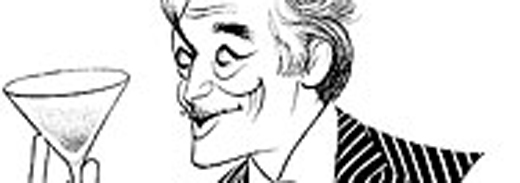Daily Office: Friday
¶ Matins: Oh! It’s China’s fault! “China, some economists say, lulled American consumers, and their leaders, into complacency about their spendthrift ways.” This is the moral equivalent of blaming the gin and vermouth for not being a fountain of youth.
You have to love the story, though, because it preserves a founding American myth: the people of our fine country are guileless rubes in a world of wicked con men.
¶ Vespers: Here’s a great idea: revoke Robert Merton’s Nobel Prize. Remember LTCM? That was his plane crash.
Holiday Note: Hodie natus est
That’s better! Decorating a wreath is not at all like decorating a tree! For one thing, you can’t count on the support of lower, longer branches. For another, the boughs on the right-hand side of the wreath all face down, ruling out the little natural niches that make it so easy to stick an ornament somewhere on the opposite side. And don’t get me started about the lighting! There is much to be learned about treating a wreath — even if, like this one, it seems to be as big as something for a truck — like a small Christmas tree.
The figures on the wreath are cloth mice decked out, we’re told, in Cambridge drag. Three or four of the seven are safety-pinned to the wreath. (This works.) On the mantel itself is our lineup of Gladys Boalt Alice-in-Wonderland ornaments.
Alice, standing up above the Mad Hatter and the Fish Footman, is the most boring of the lot, so we see her from the hem down only. My favorites are the White Rabbit and the Duchess.
In the Book Review: What A Night!
If you don’t mind, I’ll quietly backdate this leader to the time at which it ought to have appeared.
Storytelling abounds in this week’s Book Review, but Liesl Schillinger’s dependence upon it is singularly disappointing. Reviewing two novels by novelists of East German background, Ms Schillinger summarizes their curious stories without placing them in the context of contemporary German fiction or addressing the aesthetic positions that, as German fiction, the books undoubtedly occupy. That’s what I’d have liked to know something about.
Imagine reading reviews of Shakespeare’s plays that merely thumbnailed their often astounding stories, and perhaps you’ll begin to see my objection to the storytelling line of attack.
Daily Office: Wednesday
¶ Matins: The Nation, Thailand’s English-language newspaper, runs a Web site that holds its own as a contemporary news site. Here, for example, is the page of business leaders. It’s better than what one might expect of a South Asian kingdom where English is not really the second language that it is in, say, India.
And here is its capsule report of the king’s exhortation to the newly sworn-in government of Abhisit Vejjajiva. Did I say “capsule”? It’s the entire story. No comment, no color, no links to related stories. Just the royal admonition. I give it entire:
In his speech given before Prime Minister Abhisit Vejjajiva and his Cabinet, HM the King said: “If you work well, the country will be in good order and it will be a blessing. If you can ensure happiness and public order, the country will go ahead as wished by all Thais.”
¶ Tierce: The shooting death of a police officer is always a hot-button crime, so it’s especially heartening to see juries pulling back from felony murder convictions in connection with the deaths of Daniel Enchautegui and Russel Timoshenko, two policemen who were shot last year while trying to deter criminal activity. The doctrine of felony murder, which holds individuals to be guilty of any murder committed in the course of a crime to which they are accessories, is a blot on our system of justice.
¶ Sext: Read about the Ultimate Paper Airplane, at Brainiac. It is rocket science!
Private Library Note: From Crawford Doyle
“Under duress” would be overstating the terms of my visit to Crawford Doyle this afternoon, but I certainly had no intention of shopping for books. My tale of woe begins at Best Buy, at the corner of Lex and 86th. What possessed me to wander into those premises two days before Christmas can only be called ignorance. The place was a zoo. I hastened for the exit — and I saw that an earpiece had lost contact with my reading glasses.
I hadn’t lost contact with the earpiece, of course, because it was still attached to the lovely chain that Kathleen made for me last year. All the same, my favorite pair of reading glasses was now considerably less useful than my lorgnette. What to do? I thought about calling to ask if Kathleen had one of those eyeglass repair kits, but nixed that option at once. It was easier to walk the two blocks over to Madison Avenue, where I’d bought the glasses, at what was then Meyerowitz and is now Purdy.
Amazingly — it is only two days before Christmas — my repair needs were not rebuffed. I was asked to come back in half an hour.
What else to do, on Madison Avenue in the middle of the day, but kill some time looking at books? I used up about seven minutes and thirty-nine seconds at Venture Stationery, picking up the usual paper porn — notebooks, Uniballs, Altoids, and my Letts’ diary for 2009. I was not in a mood to daydream about quadrilled paper, though, so I had to push on.
Here are the books, then, that I walked out of Crawford Doyle with:
¶ Selected Poems, by Frank O’Hara (Knopf, 978-0-307-26815-0). I’ve been meaning to buy this collection for ages, because it has a fantastic verse that’s omitted in Donald Allen’s collection:
Lana Turner has collapsed!
I was trotting along and suddenly
it started raining and snowing
and you said it was hailing
but hailing hits you on the head
hard so it was really snowing and
raining and I was in such a hurry
to meet you but the traffic!
My library felt underfurnished without those utterly NYC lines.
¶ The Triumph of Music: The Rise of Composers, Musicians and Their Art, by Tim Blanning (Belknap [suck on that one, Alfred], 978-0-674-03104-3). Notwithstanding his breezy nomenclature, Mr Blanning is one of our most magisterial historians. What’s he doing writing about music? I can’t wait to find out.
Footnote: in correspondence with Nom de Plume today, I hit upon the name for a literary category that has long vexed me. Every now and then, I happen upon bookshelves that are full of books that I’ve never read and never will read. The titles look so earnest, so — what was that word? Magisterial? But I know that I’ll be bored to sobs if I try to read Norman Mailer, or Thomas Pynchon, or Kurt Vonnegut, or John Barth, or any of the other writers who seem so engaged with the wacky problems of being a guy in this mixed-up world of ours.
Dorm lit.
Daily Office: Tuesday
¶ Matins: I wish I were still in law school! I wish I were that young. Then, the idea that Bush v Gore is a precedent-laden decision would have intrigued me.
¶ Sext: How could they do it? That’s what everybody I know is talking about. How could they give all their money to Bernie Madoff? They begged him to invest it for them, dazzled partly, it’s true, by the fantastic returns that he boasted; but dazzled to the point of blindness by his reluctance to take their money. (His initial reluctance, that is…)Â
Natalie Angier explains it all to you: “A Highly Evolved Propensity for Deceit.”
Gotham Note: Christmas Now
It’s hard to believe that Christmas is right here! Not a few weeks away, but a few days away. I was hoping to write a few Christmas cards this evening — I have yet to write one — but I got no further on the Christmas front than hauling out the four boxes that hold all the miscellaneous Christmas stuff. Not the ornaments; they’re so special that Kathleen would store them in Fort Knox if she could. But, for example, the crèche that Fossil Darling’s late lamented mother bought for us in Spain, and the spinning top that I shove underneath the tree each year, as if there were an all-American, top-spinning boy in the vicinity.
The tree: ahem. It will be a small tree this year, just for Kathleen and me. We won’t be having the usual Christmas at-home this year, for perfectly nice reasons that I won’t go into. (Regular readers will fall into a catatonic state at this point: Not the Closets!) I can tell you that one of the reasons is my Better/Storage/Now! program of reassigning space in the apartment for this and that — and for giving away deze, dem, and doze other things that no longer fit in.
(I did do amazing things with the Spode platters yesterday, not to mention the new deep-fat fryer. Really, it’s almost as good as a new house!)
Christmas. When I think back on the Christmas-morning thrill of childhood, I don’t miss all the presents. I wish I could do the thrill justice. Crouching on the stairs when it was still too early to be out of bed, not wanting to make a sound but being too young to know what a “sound” might be. Looking at the tree from across the room, hardly daring to approach its nimbus of lights and tinsel, glowing in an empty room in what was still the night. Hoping that I’d find things I wanted and things I couldn’t imagine — which is why I don’t regret the naked lust for stuff. The fresh smack of fir tree scent lent an air of pious rectitude to what was in fact a craven longing for very material surprises. (A preview of coming attractions.)
Who knew what was under the tree? For four or five years, I didn’t. Then I wised up. As I say, I don’t miss the prospect of acquiring interesting new things at Christmas. But if I say that I don’t miss the thrill, that’s because I haven’t forgotten it.
Daily Office: Monday
¶ Matins: Much as I admire Frank Rich’s commentary on public affairs, I think that yesterday’s piece was a tad too populist.
We’ll keep believing, not without reason, that the whole game is as corrupt as the game show in “Slumdog Millionaire†— only without the Hollywood/Bollywood ending. We’ll keep wondering how so many at the top keep avoiding responsibility and reaping taxpayers’ billions while relief for those at the bottom remains as elusive as straight answers from those Mumbai call centers fielding American debtors.
And what’s wrong with “populist”? It ignores (or, worse, forgives) the colossal inattentiveness with which Americans have been going about their business since the tail end of our Vietnam Misadventure. I can’t tell you how many times I’ve encountered this passive-aggressive self-indulgent excuse: “Why should I pay attention to the news when there’s nothing I can do about it?”
¶ Tierce: It’s A Wonderlife Life comes to the Times this morning, in the form of a very moving Op-Ed piece by Ted Gup. “Hard Times, A Helping Hand.” Bring Kleenex.
Weekend Update: In Which I Wonder if Rachel Maddow is, After All, a Force for the Good
The brouhaha about Rick Warren almost crushed me this evening. I thought I’d been stupid, and gone for the easy decision. Put up with the man — I’d argued — it’s only for one day. The thought that this might have been weak appeasement undid me. Then Kathleen got hold of my brain. If not Rick Warren, then who? Is there a better Christian out there, with anything like Rick Warren’s reach?
Comparing the current fight for gay rights to the still unfinished business of rights for African-Americans is doomed to founder on the rocks of bogusness. Excuse me, “category mistake.” African-Americans were deemed racially inferior according to nationalist, “racist” ideas about biological origins — starting about four hundred years ago. Those ideas ideas are simply ridiculous. Homosexuals are deemed wicked according to profoundly rooted ideas about God and virtue — starting who knows when but fully articulated well over a thousand years ago. See Augustine if you’re confused.
Although I’m tempted to argue that Jesus himself would have shrugged off encounters with homosexual behavior, I’m fairly sure that there’s no support for that view. And almost everyone else involved with the religion was emphatically homophobic. In those days, there were no blacks to look down upon (or so few it didn’t matter), but all the thinkers hated gays.
And have been hating them ever since. Racism is a comparative novelty, ipso facto easier to undermine. African-Americans are certainly not going to come to the older problem’s rescue — even if AIDS kills all the nice guys.
Friday Movies: Quantum of Solace
As story goes, Quantum of Solace is something of a subprime mortgage. But as long as Daniel Craig parkours about the concrete and indulges in all the other Bond 2.0 pursuits, default is always a touchscreen away. And, for once, a Bond with chemistry! I don’t mean with the girl. I mean with M! I can’t help wondering what The Mother would have been like if Dame Judi had taken Anne Reid’s role.
Maybe I’ll understand it the second time.
Letter from Yvonne: Life of Sky

Dear R J and Daily Blague readers,
Four summers ago, the deaf kitten Sky came to live with us. Â It was like being charged with the care of a magical creature: Â beautiful, wild, ever a mystery.
Try to imagine a curious, clumsy, irrepressible little being who emits a wide vocabulary of charmingly expressive noises.  If that made you think of WALL-E, you’re pretty close!…Now try to imagine WALL-E as a fearless living plush-toy, rather than a skittish robot.
Sky deserves his very own musical theme.  Not like that clarinet-voiced cat from Peter and the Wolf, though; Sky’s theme would be a perfectly-balanced fusion between Prokofiev’s carefree child-of-nature Peter, and the single-minded wolf!  So please try to hear that woven through the following scenes… Read the rest of this entry »
Daily Office: Friday
¶ Matins: It’s time to pay up. You’re reading this for free, and, for the time being, that’s fine. I don’t need the money right now. But The New York Times, from which I draw so many of my links, does. It’s teetering on the edge of bankruptcy. Handwriting on the wall:
- James Surowiecki in The New Yorker. Moral of the story? You get what you pay for; or: you pay nothing, you get nothing.
- Richard Pérez-Peña in The New York Times. The incredible shrinking Washington press corps.
Now, I’m a paid-up subscriber who gets everyday delivery of the paper. Your cost could be much, much lower. Who knows how low? The problem is, nobody’s really asking.
Daily Office: Thursday
¶ Matins: Wouldn’t it be nice if Arianna Huffington’s wish comes true, and the Madoff Affair puts an end to the faux-cluelessness of modern management?
¶ Tierce: Today’s verse of the Madoff chapter: New York’s commercial real estate developers. This mess begins to look like one of Stanley Milgram’s disturbing behavioral experiments. While there’s no doubt that the SEC blew this one, it’s hard to feel sorry for investors who overrode commonsense basics in the stampede to “invest.” Especially when Mr Madoff appears to have mirrored their own way of doing business.
The outsize impact on the industry may have resulted largely because Mr. Madoff (pronounced MAY-doff) managed his funds much the way that real estate leaders have operated successfully for decades: He provided little information and demanded a lot of trust.
¶ Nones: Thailand seems to have turned a corner, as defectors from the People’s Power Party in support of a coalition government headed by Abhisit Vejjajiva. Â
¶ Vespers: In 1618, the Defenestration of Prague launched the Thirty Years’ War. (Catholics threw some Protestants out the window.) In 2008, the ? of Baghdad ended the American Misadventure in Iraq. (Wouldn’t that be nice!)
¶ Compline: Something I’d written myself: Lee Stranahan’s plea for large-mindedness from folks unhappy with President-Elect Obama’s invitation to Rick Warren to deliver the invocation on 20 January.
Morning Read: Quiet
¶ In “The Spirit-Spout,” the Pequod traverses the calm South Atlantic, where a ghostly silver spout, “like some plumed and glittering god uprising from the sea,” teases the crew with the promise of prey, and passes the “Cape Tormentoso,” as Melville would rename the Cape of Good Hope. The chapter is a small masterpiece of uneasy beauty, notable for its varied impressions of unearthly quiet.
Close to our bows, strange forms in the water darted hither and thither before us; while thick in our rear flew the inscrutable sea-ravens. And every morning, perched on our stays, rows of these birds were seen; and in spite of our hootings, for a long time obstinately clung to the hemp, as htough they deemed our ship some drifting, uninhabited craft: a thing appointed to desolation, and therefore fit roosting-place for their homeless selves. And heaved and heaved, still unrestingly heaved the black sea, as if its vast tides were a conscience; and the great mundane soul were in anguish and remorse for the long sin and suffering it had bred.
The hootings are silenced by their ineffectiveness.
Melville wraps all of this up with a picture, for once more grave than off-putting, of Ahab alone in his cabin, “the rain and half-melted sleet of the storm from which he had some time before emerged, still slowly dripping from the unremoved hat and coat.”
¶ Don Quixote discourses lovingly on the horrors of war, his anger spurred only by that most unchivalrous invention, artillery. It was modern artillery, of course, that put the old aristocratic cavalry out of business, setting its horsemen free to dream about the glories of hand-to-hand combat in the very romances that would drive our hero mad.
I grew up hearing the word “cavalry” as a synomym for the American military forces that subdued Native Americans in the old West. It had not occurred to me before today that the revival of medieval warfare made perfect sense when confronted by a Neolithic enemy.
In the Book Review: The 10 Best Books of 2008
The Times’s choice of the year’s ten best books has already been discussed (in Matins).
While I think I see what Ed Champion means about a different tone in this week’s Book Review, I can’t agree that the issue is all that it could be. Non-walker DT Max’s review of Geoff Nicholson’s book about walking still has me hiccuping.
Daily Office: Wednesday
¶ Matins: In this time of PETA and no-foie-gras, George lawmakers want to make it easier to secure a death penalty. Save the animals, kill the people: is that the American Way? It does seem so. You could polish up an argument that the nation’s early settlers underwent the harrowing ordeal of crossing the Atlantic because they were pathological misanthropes.
¶ Tierce: Comparing China’s economy to ours, this morning, Tom Friedman reminds us to be careful about what we ask for:
But while capitalism has saved China, the end of communism seems to have slightly unhinged America. We lost our two biggest ideological competitors — Beijing and Moscow. Everyone needs a competitor. It keeps you disciplined. But once American capitalism no longer had to worry about communism, it seems to have gone crazy. Investment banks and hedge funds were leveraging themselves at crazy levels, paying themselves crazy salaries and, most of all, inventing financial instruments that completely disconnected the ultimate lenders from the original borrowers, and left no one accountable. “The collapse of communism pushed China to the center and [America] to the extreme,†said Ben Simpfendorfer, chief China economist at Royal Bank of Scotland.
¶ Sext: Yet another droll site that everybody knew about before I finally stumbled upon it, in the usual way — thanks to Joe or Jason (in this case, Joe).
¶ Vespers: Have you heard of Maria Semple’s This One Is Mine? I hadn’t either, but after reading about it at Three Guys One Book, I’m ordering a copy.
Morning Read: En boca de la fama

¶ Now do we know who those dusky phantoms were, bobbing so gothically about the Pequod before her embarkation, latterly bumping so furtively within the hold. They’re Ahab’s own boat crew, enlisted at his own expense, and in contravention of the joint-owners’ ideas about a captain’s prudence. If what I’ve just written is incomprehensible, then I have captured the spirit of today’s reading.
More than an adventure story, Moby-Dick is a romance, stuffed with wishful dreams.
…but the like of whom now and then glide among the unchanging Asiatic communities, especially the Oriental isles to the east of the continent — those insulated, immemorial, unalterable countries, which even in these modern days still preserve much of the ghostly aboriginalness of earth’s primal generations…
What utter balderdash! There are no such unchanging communities, especially in Asia, which has always hummed with commerce of every kind. Ishmael’s is the paedophilic dream of Western colonizers, always dreaming of yet-untouched lands.
¶ Chapter XXXVII of Don Quixote is the most convivial so far. There is no violence, but only a convivial dinner, after which our hero addresses his friends on the superiority of arms over letters — a venerable topic at the time.
Had I but world enough and time, I would study this chapter, in order to plumb its humanism. The effort made by Don Fernando, by the noble ladies, and, most of all, by Cervantes himself, to make a space in which Don Quixote can be comfortable and even honored is enormously heart-warming, and whatever need there might be to advance the story, the chapter is essentially a grand pause, a sigh of respect for the differences between men and women of good will.
Even so, as a man of his time, Cervantes cannot help marking a great distinction — an unbridgeable divide, really — between the gentlefolk and the peasants, among whom Sancho and the innkeeper figure as insensitive, unimaginative dolts (mentecato).
Daily Office: Tuesday
¶ Matins: The Cutup-in-Chief is unflappable: ““I’m pretty good at ducking, as most of you will know…”
President Bush ducked — and didn’t get it. He seems to have thought that Muntader al-Zaidi’s outrage was a party prank gone awry, and certainly not representative of any widespread feelings about Duckya’s screwups in his homeland. Who knows what kind of an afterlife the episode is going to take on? Will Mr al-Zaidi one day head Iraq, in the manner of dissident playwright Vaclav Havel?
¶ Tierce: In yesterday’s “Deal Book,” there was a squib about what John Kenneth Galbraith’s study of the 1929 Crash has to tell us about the Madoff Fraud: the first is not the worst.
¶ Vespers: Joseph O’Neill writes! Well, of course…but don’t hold your breath between publications. How exciting, then, to read, at Maud Newton, that Mr O’Neill is a contributor to the current issue of Granta! I rush to yesterday’s mail, and there it is, “Fathers.” Turn to page 76, “Portrait of My Father” — a common title in the book. But what’s this, only three pages!Â


















